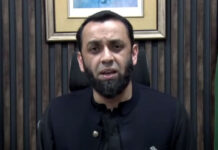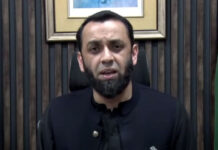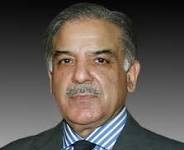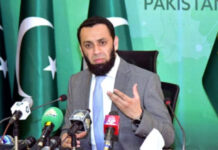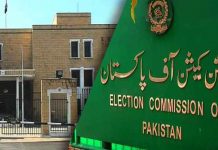ISLAMABAD: The matter of harassment to individuals by law enforcement agencies over alleged attempts to malign Pakistan Army and the government has landed in the court of law as the first writ petition was moved before the Islamabad High Court (IHC) by a journalist, challenging the summons to him by the Federal Investigation Agency (FIA).
Taha Shakeel Siddiqui, a correspondent for France 24 in Pakistan, while instituting petition in the IHC alleged that the Counter-Terrorism Department (CTD) of the FIA harassed him over phone by summoning him for interrogation.
He requested the court to direct interior ministry and the FIA to desist from harassing citizens simply because they have expressed a view or are carrying out their professional duties.
The journalist filed the petition under Article 199 through his counsel Asma Jahangir, making ministry of interior, director general FIA, deputy director CTD FIA Noman Bodla respondents.
A week ago, on the directives of Interior Minister Chaudhary Nisar, the FIA identified and arrested dozens of suspects allegedly involved in campaign against Pakistan Army on social media.
According to the information appearing in the press and later confirmed by political parties and human rights organisations, around 900 cases have been filed by the FIA against individuals over expressing themselves freely.
“I feel I am being targeted for reporting about army without self-censorship. Freedom of speech is not a crime but a democratic right. I cannot be silenced,” Taha Siddiqqui stated in one of his tweets.
The petition has been fixed for urgent hearing and a single bench of IHC comprising Justice Aamer Farooq will take up the matter for hearing on Tuesday (today) at 8:30 am.
“The caller who introduced himself as Noman Bodla from the CTD of FIA demanded that the petitioner (Taha) may appear before him at the FIA headquarters for an interrogation,” the petition stated.
“On the petitioner’s query about the nature of the interrogation, the deputy director responded vaguely and gave no details of the interrogation that he wanted to conduct which entailed the presence of the petitioner. He did however hint that the interrogation concerned issues and opinions on which the petitioner had written journalistic pieces and as such it involved the petitioner’s professional work,” the petition further stated. According to Taha, the deputy director insisted him to appear at the FIA headquarters despite several attempts to convince the officer that his professional work was in the public domain and could be accessed without his presence or interrogation.
He further stated that he was reluctant to visit the FIA headquarters due to several reports that once the person who was to be interrogated sets out to the FIA headquarters, he is either picked up and disappeared or detained illegally.
“The petitioner is a journalist and it is his responsibility to collect information and impart this information to the public at large and in this manner the petitioner has to meet several people including those in the government and at no time has anyone had any grouse with the petitioner regarding professional work, therefore the phone call from FIA officer was quite shocking for the petitioner,” the petition reads.
“It is inconceivable that the counter-terrorism department of the FIA should be calling up a journalist who has nothing to do with terrorism and is a person of the pen,” it added. He argued that the actions of FIA were violative of his fundamental rights under Articles 4 and 9 of the constitution, adding that the deputy director had acted without lawful authority as such powers were not granted to him through the Federal Investigation Agency Act, 1977.



